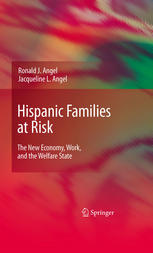

Most ebook files are in PDF format, so you can easily read them using various software such as Foxit Reader or directly on the Google Chrome browser.
Some ebook files are released by publishers in other formats such as .awz, .mobi, .epub, .fb2, etc. You may need to install specific software to read these formats on mobile/PC, such as Calibre.
Please read the tutorial at this link: https://ebookbell.com/faq
We offer FREE conversion to the popular formats you request; however, this may take some time. Therefore, right after payment, please email us, and we will try to provide the service as quickly as possible.
For some exceptional file formats or broken links (if any), please refrain from opening any disputes. Instead, email us first, and we will try to assist within a maximum of 6 hours.
EbookBell Team

4.0
56 reviewsHispanic Families at Risk: The New Economy, Work, and the Welfare State
by Ronald Angel, The University of Texas at Austin, Austin, TX, USA
and Jacqueline Angel, The University of Texas at Austin, Austin, TX, USA
In the United States, work is the key to economic success, as well as the major source of health care coverage and retirement security. While Europeans look to the State for these benefits, Americans for the most part do not. This system of employment-based benefits means that those disadvantaged in the labor market are also disadvantaged in terms of health care coverage and retirement security.
The authors of this work examine the overrepresentation of Mexican Americans in low wage or service sector jobs, which rarely come with health insurance or retirement coverage. At all ages, Mexican Americans have lower rates of health insurance and retirement coverage than do other minority groups, such as African Americans or other Hispanic groups.
Although employment in jobs that do not provide benefits is one major source of this disparity, other factors, including immigration history, citizenship status, and language proficiency, contribute to the blocked opportunities for upward mobility that the Hispanic population faces.
In their analysis, the authors work to deemphasize cultural or individual failure explanations of the persistent economic and benefit disparities between Hispanics and other groups, and focus on the role of institutionalized structural factors. In each chapter, the authors identify and critique the factors that affect the economic security and health care access of individuals throughout the life course, suggesting policies for reform.
This work will be of interest to anyone working in the fields of cultural studies, public health and the sociology of work. With the focus on real world causes for the problems as well as potential solutions, policy-makers will also find this informative book an essential resource.